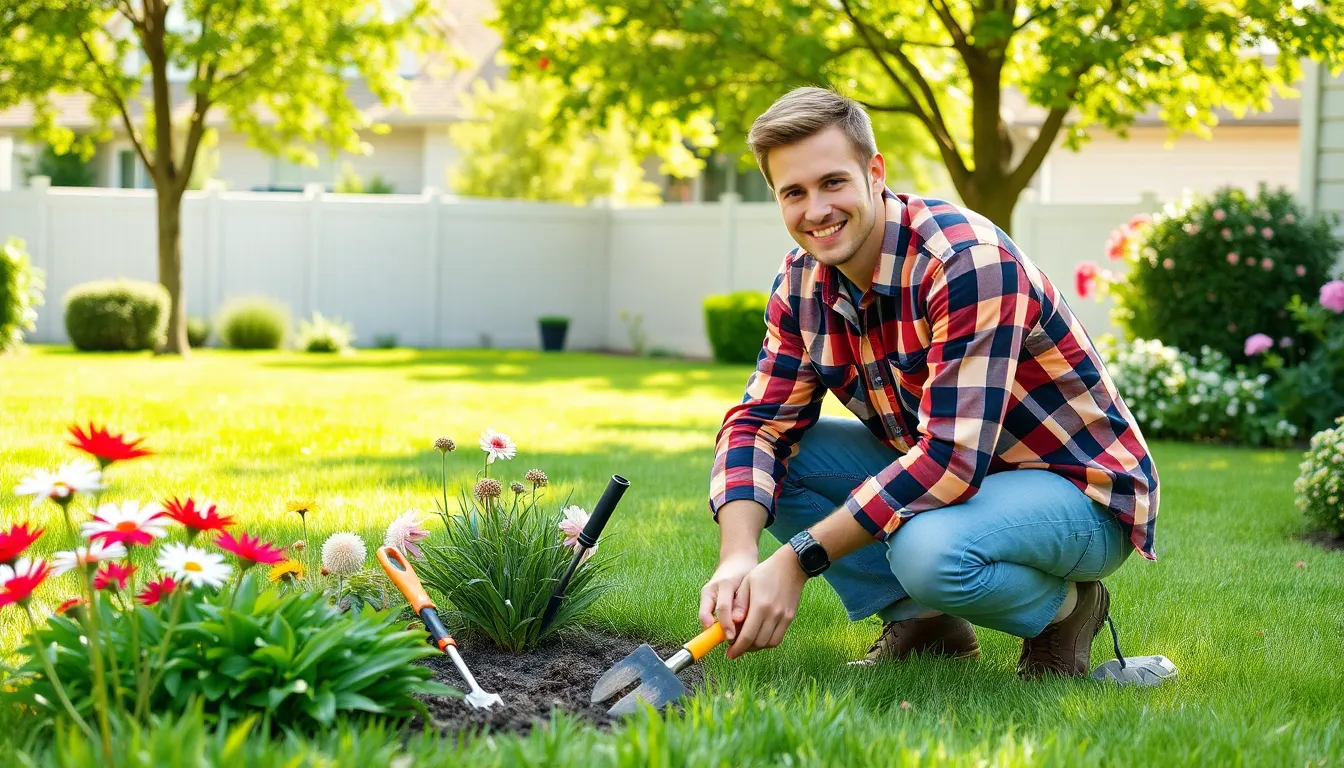Owning a home is like adopting a pet—exciting, a bit overwhelming, and full of surprises. New homeowners often find themselves knee-deep in a world of paint swatches, lawn care, and mysterious noises in the attic. But fear not! With a few key home maintenance tips, they can tackle these challenges like pros and keep their castle in tip-top shape.
Table of Contents
ToggleImportance of Home Maintenance
Home maintenance holds significant value for new homeowners. Effective maintenance prevents larger problems from arising. Regular upkeep protects investments and helps maintain property value.
Neglecting tasks like roof inspections or gutter cleaning can lead to costly repairs. For instance, ignoring roof leaks might cause extensive interior damage. Homeowners face fewer surprises through consistent monitoring of systems and structures.
Proper maintenance promotes safety in the living environment. Checking smoke detectors ensures they function correctly. Regularly inspecting electrical systems reduces the risk of fire hazards.
Routine landscaping contributes to curb appeal as well. Well-maintained lawns and gardens enhance aesthetic value. New homeowners establish a sense of pride by keeping outdoor spaces tidy.
Residential systems require attention, too. HVAC systems benefit greatly from regular filter changes and annual servicing. Plumbing issues often escalate if leaks or clogs aren’t addressed promptly.
Home maintenance creates a comfortable living experience as well. Clean air filters improve indoor air quality, benefiting health. A well-maintained home fosters a welcoming atmosphere for family and friends.
New homeowners should create a maintenance schedule to stay organized. This proactive approach simplifies tracking various tasks throughout the year. Prioritizing seasonal checklists clarifies which actions to take each month.
Overall, recognizing the importance of home maintenance helps homeowners enjoy their new space. A consistent commitment ensures longevity and satisfaction in homeownership.
Seasonal Maintenance Checklist

New homeowners should focus on seasonal tasks to maintain their property efficiently. This checklist aids in keeping homes in top shape throughout the year.
Spring Maintenance Tips
Spring brings the opportunity to refresh and inspect. Check gutters for debris, ensuring proper water flow. Inspect roofing for damage after winter storms. Clean window screens for clearer views. Test the irrigation system, adjusting for seasonal needs. Plant flowers and vegetables to enhance outdoor aesthetics. Conduct a thorough check of outdoor furniture, preparing for use.
Summer Maintenance Tips
Summer emphasizes exterior care and comfort. Inspect air conditioning units for functionality before heat peaks. Schedule a professional cleaning for carpets and upholstery. Check for pest infestations, applying preventive measures as necessary. Power wash patios and driveways, enhancing curb appeal. Maintain landscaping by trimming bushes and mowing lawns regularly. Clean and seal decks to protect against moisture.
Fall Maintenance Tips
Fall signals the need for preparation against winter elements. Clean gutters to prevent ice dam formation. Inspect and repair windows and doors for drafts. Service heating systems, ensuring they’re ready for cold weather. Rake leaves to keep yards tidy and prevent mold growth. Store outdoor furniture, protecting it from the elements. Test smoke and carbon monoxide detectors, ensuring safety measures are functional.
Winter Maintenance Tips
Winter necessitates proactive strategies to safeguard homes. Check insulation in attics and basements for efficiency. Inspect pipes, insulating exposed areas to prevent freezing. Clear snow and ice from walkways for safety. Monitor heating systems, scheduling repairs as needed. Review emergency kits, ensuring supplies are stocked. Encourage an indoor environment by checking humidifiers, mitigating drying effects.
Essential Home Maintenance Tasks
New homeowners face crucial maintenance tasks to preserve property value and ensure comfort. Prioritizing these tasks helps prevent costly repairs.
Plumbing Maintenance
Inspecting plumbing systems regularly prevents leaks and water damage. Homeowners should check for drips in faucets, running toilets, and signs of moisture around fixtures. Drain cleaning remains vital to avoid clogs. Flush drains with a mixture of baking soda and vinegar monthly to keep them clear. Inspecting water pressure also aids in identifying underlying issues. A water pressure gauge can help determine if adjustments are necessary. Remember to know the location of the main water shut-off valve for emergencies.
Electrical System Checks
Assessing the electrical system safeguards against fires and ensures functionality. Homeowners should check outlets for discoloration or buzzing sounds. Circuit breakers must function correctly; replacing tripped breakers is essential. Keep an eye on extension cords to prevent overloading circuits. Testing smoke detectors and carbon monoxide alarms twice a year guarantees early warning during emergencies. Employing a licensed electrician for significant wiring issues prevents hazards.
HVAC System Care
Maintaining HVAC systems contributes to energy efficiency and comfort. Homeowners should change air filters every three months to enhance airflow and indoor air quality. Scheduling annual professional inspections ensures systems operate at peak performance. Check thermostat accuracy and clean vents to optimize heating and cooling. During cooler months, homeowners can insulate ducts to prevent heat loss. Keeping outdoor units free from debris also maintains efficiency. Regular maintenance promotes a comfortable and safe living environment.
DIY vs. Hiring Professionals
New homeowners confront the decision of whether to tackle maintenance tasks themselves or to hire professionals. Making informed choices ensures efficient upkeep and cost-effectiveness.
When to Do It Yourself
Consider handling minor repairs and routine maintenance tasks. Tasks like changing air filters or painting walls typically require basic skills and tools. Many homeowners find it satisfying to take on gardening, lawn care, or cleaning gutters. Familiarity with the home enables them to spot issues before they escalate. Simple plumbing tasks, such as unclogging drains, often fall within the DIY realm. Assessing personal skill levels helps determine whether a task is manageable. Completing small projects can save money while enhancing comfort in the living space.
When to Call a Professional
Complex repairs often necessitate professional help. Electrical work, for example, demands specialized knowledge and carries safety risks. Hiring licensed plumbers becomes essential when addressing severe leaks or pipe replacements. Homeowners should also consider professionals for roof inspections and HVAC repairs. Professionals bring expertise and experience, ensuring tasks meet safety standards. Serious issues, like structural damage or mold detection, require immediate professional assessment. Before undertaking any intricate task, evaluating the risks versus benefits proves crucial. It’s important to factor in the long-term costs of hiring experts against potential DIY mistakes.
Homeownership brings both joy and responsibility. By embracing essential maintenance tasks, new homeowners can safeguard their investment and create a comfortable living environment. Staying proactive with seasonal checklists and routine inspections not only prevents costly repairs but also enhances safety and aesthetic appeal.
Balancing DIY efforts with professional assistance ensures that homeowners can confidently tackle repairs while knowing when to call in experts. This approach fosters a sense of accomplishment and peace of mind. Ultimately, prioritizing home maintenance paves the way for a rewarding and enjoyable homeownership experience.







